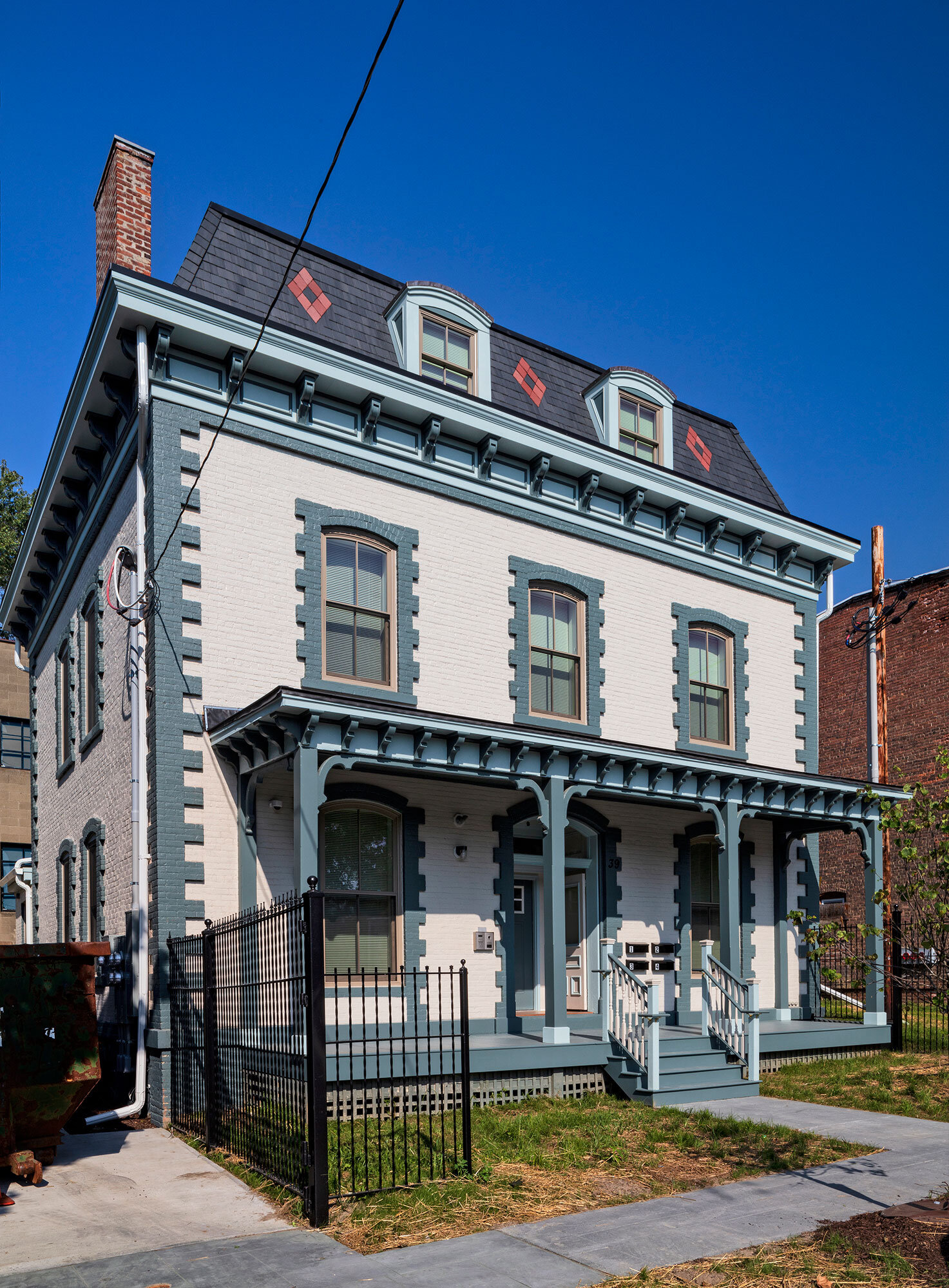Land Banks, Preservation & Affordable Housing
What role should preservation play in the affordable housing crisis? The League champions historic preservation as a tool to help build more just, sustainable, and resilient communities. But viewing preservation through this lens requires us to consider how to incorporate affordable housing into our work. Communities, whether they are rural or urban, are not equitable if only a certain socioeconomic class can afford to live there.
Pictured are affordable housing projects mentioned by our panelists. From left: The Clinton Avenue Apartments in Albany, a restoration project undertaken by Home Leasing; The Ethel T. Chamberlain House was restored by Housing Visions, after acquiring the property through the Greater Syracuse Land Bank. This restoration won an Excellence in Historic Preservation Award in 2020. Photo credit: Don Cochran; RUPCO’s East End Apartments of Historic Newburgh consists of 45 mixed-income apartments in 15 buildings acquired through the Newburgh Community Land Bank. This project won an Excellence in Historic Preservation Award in 2019. Photo credit: David Miller.
The fact that there is both a housing shortage and a surplus of vacant buildings — most of them older housing stock — presents an opportunity to save buildings while creating high quality affordable housing. In the case of land banks, many of the vacant, abandoned, and tax-delinquent properties they acquire may also be historic structures — and historic status should be recognized as an asset, not an obstacle, in successful and sustainable efforts to return blighted properties and neighborhoods to productive use. By utilizing incentives like the Historic Tax Credit and the Low-Income Housing Tax Credit, these historic structures can not only come back to active use, but also provide much-needed affordable housing.
We invited several professionals whose work exists at the intersection of preservation and affordable housing to hear their perspectives on how this work is being done successfully — and what challenges still exist. Our panelists share examples of how preservation and affordable housing efforts can work together, from community land trusts to land banks, along with specific project examples.
THIS EVENT WAS PART OF THE LEAGUE’S FUTURE OF PRESERVATION WEBINAR SERIES. THANK YOU TO OUR PROGRAM SPONSORS, THE PEGGY N. & ROGER G. GERRY CHARITABLE TRUST.
Caroline Cheong is an assistant professor in the University of Central Florida’s History department. Her research spans historic preservation and economic development, focusing on the relationship between urban heritage conservation, urban regeneration and poverty reduction, with a particular focus on the Global South. Originally from California, she earned her PhD from the University of Pennsylvania in City and Regional Planning, her MS in Historic Preservation from the University of Pennsylvania, and her BS in Anthropology from the University of Chicago. Previously, Caroline was the Director of Research for Heritage Strategies International and PlaceEconomics through which she published numerous publications focusing on the economic impacts of historic preservation with preservation economist Donovan Rypkema.
Bret Garwood joined Home Leasing in 2017 and serves as Chief Executive Officer. Before Home Leasing, Bret served as Senior Vice President for Multifamily Programs for New York State Homes and Community Renewal where he oversaw the development and implementation of affordable housing finance and development programs. Bret previously served as Director of Business and Housing Development for the City of Rochester from 2007-2013. He directed the planning and implementation of the City’s economic development, housing and real estate functions under a mission to enhance Rochester through real estate development, neighborhood revitalization, business attraction, housing production and rehabilitation, and workforce development. Bret holds a Bachelor of Science degree in Architecture from Lehigh University and a Master of Science in City and Regional Planning from Cornell University.
Darren Scott joined NYS Homes and Community Renewal in January 2017 as Upstate East Director of Development. Mr. Scott brings to HCR 25 years of experience, performing development work for the Albany Housing Authority and volunteering on the boards of housing and supportive service providers, in assisting local government and stakeholders to improve quality of life through the development of affordable housing and neighborhood revitalization. Mr. Scott is committed to expanding housing opportunities for all New Yorkers by increasing awareness of and providing greater access to HCR funding programs and expertise.
Katelyn Wright is the founding Executive Director of the Greater Syracuse Land Bank, which was incorporated in 2012 and is acts in partnership with the City and County to address tax-delinquent, vacant, and abandoned properties. She was the founding president of the NY Land Bank Association, land banks’ statewide trade association, where she currently serves as the treasurer. Prior to her role with the Land Bank, Katelyn worked as a land use planner for the City of Syracuse was the primary author of the Land Use & Development component of the City’s recently adopted Comprehensive Plan 2040. Katelyn earned her MRP from Cornell University in 2010 and has a professional background in land use planning and historic preservation.
Kevin O’Connor has been RUPCO's Chief Executive Officer since 2002. Throughout his 32 years of experience in the housing sector, he has transformed communities in the Hudson Valley through the development of supportive and affordable housing that include multigenerational, artist and homeless housing, homeownership and commercial units. Mr. O’Connor serves on the board of directors of Pattern for Progress and the National NeighborWorks Association.
Prior to joining RUPCO, Mr. O’Connor served as Associate Executive Director at Hudson River Housing in Poughkeepsie, New York. Mr. O’Connor holds a B.A in Communications from Marist College and is also a graduate from the Harvard Kennedy School's Achieving Excellence in Community Development program.
This program is part of the League's Future of Preservation webinar series. Thanks to our program sponsor: Peggy N. & Roger G. Gerry Charitable Trust.



